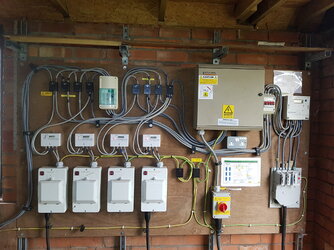A bit of an embarrassing question.
I have a regular customer who I enjoy working for. He has asked me to install an EV rapid charger for his avant loader (electric tractor type thing). I always turn down 3 phase jobs as I don't feel I understand it fully, but I'd like to do this job.
I believe this is the charger (400V/32A version) Rapid battery charger, e6 - https://www.avanttecno.com/uk/options/rapid-battery-charger-e6
I have added a picture of the 3 phase supply.
1. Are there any additional tests to do, compared with single phase? Phase rotation etc.
2. Is it simply a matter of connecting L1, L2, L3 from the Henly blocks (or perhaps the 3 phase merlin gerlin board) into whatever the instructions say is needed? (eg 30mA RCD)
3. I get a little confused by the role of the neutral in polyphase. Does the neutral have a role in 3 phase or is it simply there to support single phase appliances?


I have a regular customer who I enjoy working for. He has asked me to install an EV rapid charger for his avant loader (electric tractor type thing). I always turn down 3 phase jobs as I don't feel I understand it fully, but I'd like to do this job.
I believe this is the charger (400V/32A version) Rapid battery charger, e6 - https://www.avanttecno.com/uk/options/rapid-battery-charger-e6
I have added a picture of the 3 phase supply.
1. Are there any additional tests to do, compared with single phase? Phase rotation etc.
2. Is it simply a matter of connecting L1, L2, L3 from the Henly blocks (or perhaps the 3 phase merlin gerlin board) into whatever the instructions say is needed? (eg 30mA RCD)
3. I get a little confused by the role of the neutral in polyphase. Does the neutral have a role in 3 phase or is it simply there to support single phase appliances?

Last edited by a moderator:








